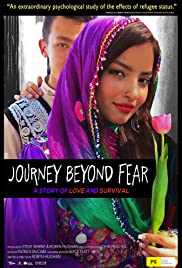
JOURNEY BEYOND FEAR
Australia, 2018, 99 minutes, Coloour.
Directed by Robin Hughan.
"How many Afghan families have we met? Probably never in Afghanistan itself! But what about in other countries? What about in Australia?
Documentary filmmaker, Robyn Hughan has had a long interest in the plight of refugees, especially to Australia. Her documentary, A Nun’s New Habit, stems from her contact with many refugees and the families, her going to Woomera and the exploration of life in detention centres, her contact with a Good Samaritan sister, Carmel Wauchope and her work with the detainees.
Journey Beyond Fear is a more ambitious project. Robyn Hughan, with cinematographer and co-producer, Steve Warne, have spent almost 7 years on this film. While it is a documentary, 99 minutes, it also plays as a humane narrative, inviting and drawing audiences into the life of this family, mother and father and three daughters.
There is no voice-over commentary. Rather, the film relies on the vitality of the personalities of the family, Bismilla and Fatima, the parents, and the three daughters, Zahra, Zeinab and a little girl under ten.
With contemporary news footage, especially from the late 90s, Afghan television and Al Jazeera, the audience learns that the family are victims of a massacre in 1998. While there are violent scenes, there are also glimpses, challenging our responses, of the Taliban harshly beating women.
The family were able to move through Pakistan into Iran where they lived for the best part of 12 years, finding it difficult to settle, the children not being able to be educated, a hard life. This meant that they moved on to Malaysia where this film opens in 2011. It then tracks the family’s life in Malaysia for the next four years. It is hard for Australian audiences and audiences from more comfortable Western countries to appreciate what it is like for a family to be uprooted, to be unsettled, on the list with the United Nations for migration to another country but having to wait, year after year, for any news of progress.
The director had access to the family over these years and filmed them in all kinds of circumstances so that we can feel that we are part of the family - older audiences appreciating the pressures on the parents, younger audiences, especially teenage audiences, able to empathise with the girls, perhaps wondering how they might react in parallel circumstances.
In fact, the strong personality of the oldest daughter, Zahra, begins to dominate the story. At first, she is an enthusiastic girl, especially about the possibilities for education. She excels at a special school for Afghan refugees. However, her father earns his meagre keep with 18 hours a day of bread baking with the daughters on bicycles delivering to hard-won customers, which means that Zahra has to find work, sometimes in the stores at an affluent mall, even selling men’s underwear, but the proprietors of the stores cannot be held accountable and are reluctant to pay her properly.
As the years progress, she grows older, misses out on education, has passing jobs, she is seen as saying she has become tired of life. At one stage, she does contemplate going up onto the roof and jumping. It is sad to see how a vibrant young girl in her mid teens can become so depressed. Her younger sister keeps a calmer approach while the little sister, still under 10, loves to dance, is something of a roly-poly live wire in the family.
And all the time we are seeing the mother and father, he a genial man, having learnt some English, making the bread but regretting he does not have more time for his family, she a rather extroverted and exuberant woman who has a zest for life.
Because of the title, we know where the drama is leading. In fact, so powerful is the presentation of the years without hope and then the sudden emerging of the possibilities of getting visas and air tickets for Australia (which also have their brief but anguishing delays), we could feel that the film will end with the family arriving in Melbourne.
But, as the title suggests, the journey goes beyond fear and we have a need to see where the journey ends as well as where it leads to.
We see the refugees arriving, welcomed, meeting up with fellow refugees, assisted by locals. The big prospect is the girls actually going to school, getting their uniforms, the discussions whether the girls will wear the scarf or not (Zahra not wearing it, like her mother, but Zeinab opting to wear it). Actually, the film shows pretty well how comfortable life can be in Melbourne. Then there are glimpses almost a year on, then almost 2 years on, the girls and their achievement, the father getting a job, the mother learning English, the family saying that have no home now in Afghanistan. Australia is their home.
While there is some information at the end of the film about the plight of refugees and how few actually are settled, this is not a polemical film. Although it shows so many difficulties, the potential for despair, it is a humane look at a family, lively, colourful, hoping for a new life and actually finding it.
Audiences from countries hosting refugees often know about this from television news, Facebook entries, even perhaps newspapers, but they don’t always have direct
contact. This film could serve as a kind of bridge towards involvement with refugees, their coming, their staying, their continuing lives."